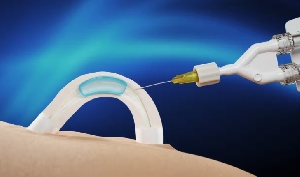- Home - Entertainment
- Lifestyle News
- Year In Review
- Music News
- Entertainers
- Entertainment Archive
- Entertainment Photos
- Jokes
- Entertainment Headlines
- Ameyaw Debrah
- Brown GH
- Celebrities Buzz
- GH Base
- Ghana Celebrities
- Gh Gossip
- GH Page
- GH Splash
- Hot Gossip GH
- YEN
LifeStyle of Wednesday, 30 April 2025
Source: www.ghanawebbers.com
Non-hormonal male contraceptive implant lasts at least two years in trials
An implantable, non-hormonal male contraceptive has shown promising results in trials.
The contraceptive, called Adam, is a water-soluble hydrogel. It is implanted in the sperm ducts to prevent sperm from mixing with semen.
Contraline, the company behind Adam, claims it offers a reversible alternative to condoms and vasectomies. The hydrogel breaks down in the body after a set time, restoring fertility.
In phase 1 clinical trials, Adam successfully blocked sperm release for 24 months. No sperm was detected in the semen of two participants who reached this milestone. Additionally, no serious adverse events were reported.
Kevin Eisenfrats, founder and CEO of Contraline, expressed excitement about these results. He stated that their goal was to create a two-year-long male contraceptive. Eisenfrats noted that there is demand for temporary or reversible male birth control.
He mentioned that 25 participants were enrolled at different times during the trial. More results are expected soon as proof of concept continues to develop.
The implant procedure takes about 10 minutes and uses local anesthesia. This means patients remain awake during the process.
Adam is not the first male contraceptive designed to block sperm ducts (vas deferens). However, other implants used materials that did not break down in the body. There is little data on whether fertility returns after removal of those implants.
Eisenfrats explained that some implants could cause scarring and permanent sterilization concerns.
The results from the Adam trial have not yet been published in a peer-reviewed journal. They also do not include data on how easily the implant can be reversed.
However, Eisenfrats assured that the hydrogel has a predictable lifespan and breaks down over time in animal trials. Lower doses tested in men showed shorter periods of efficacy.
He compared Adam to an intrauterine device (IUD) for men. After two years, men can decide whether to get another implant or reverse it on demand.
Sperm tests may allow men to check at home if the contraceptive remains effective. Contraline plans to start phase 2 clinical trials in Australia later this year with 30 to 50 participants.
Prof Richard Anderson from the University of Edinburgh welcomed these findings as impressive progress. He noted we now have both hormonal and non-hormonal methods nearing market readiness for men.
However, Anderson and Prof Jon Oatley from Washington State University pointed out some concerns. Currently, no data shows how reversible Adam is or how long one implant lasts.
Anderson emphasized that it hasn't been proven whether the implant can be removed safely either. Oatley added that long-term effects of blocking the vas deferens are still unknown.
Oatley believes while Adam could be an effective option for men, its uptake might be limited. He suggested most men would prefer pills or patches over surgical options like this one.











